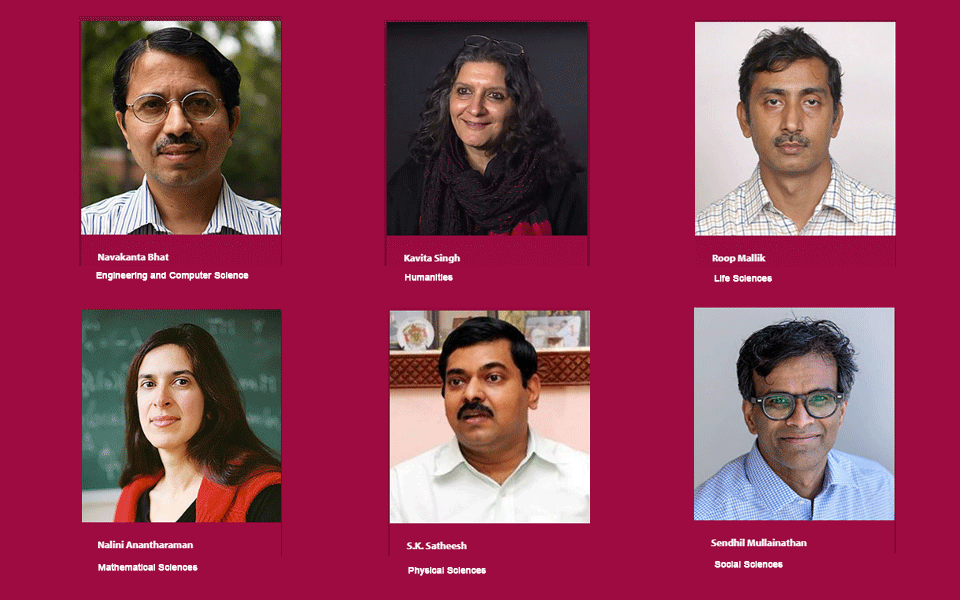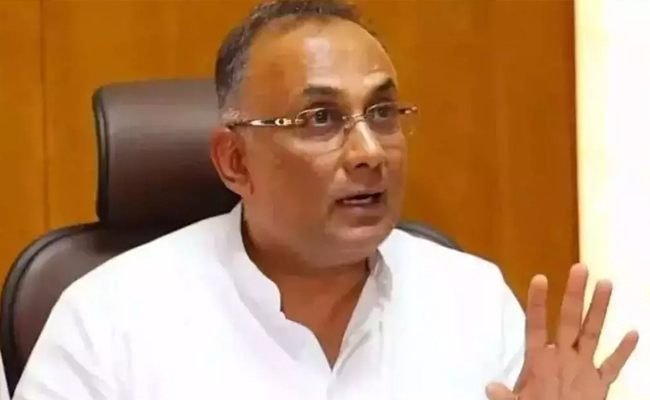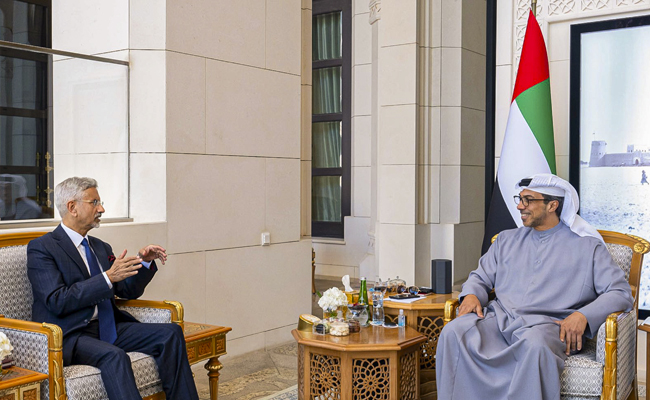Bengaluru, Nov 13: Six eminent professors have been awarded the Infosys Prize 2018 across different categories of science and research, the software major's science foundation announced Tuesday.
The annual award includes a pure gold medal, a citation and a prize purse worth USD 100,000 (or its equivalent in Indian rupees), the Infosys Science Foundation (ISF) said in a statement.
"India needs to cement its place as a hub for innovations across various fields of science," said Narayana Murthy, Trustee ISF and Founder, Infosys.
"The Infosys Prize seeks to honour the efforts of some of the brightest scientists and researchers and highlight the country's ongoing quest for science excellence," Murthy said.
A six-member jury of renowned scientists and professors selected the winners from 244 nominations received in six categories, ISF said.
By recognising these researchers and celebrating their achievements, the Infosys Prize aims to inspire young minds to explore science as a career option and advance innovation in the country, the foundation said.
"With improving synergies between the scientific community and industry we are poised for cutting-edge science and research innovation. The science of today is, after all, the technology of tomorrow," said K Dinesh, President of ISF.
In the field of Engineering and Computer Science, Navakanta Bhat, Professor, Indian Institute of Science, Bangalore was awarded for his work on the design of novel biosensors based on his research in biochemistry and gaseous sensors that push the performance limits of existing metal-oxide sensors.
Bhat has devised gas sensors with ultra-precise detection accuracies necessary for space and environmental monitoring, especially useful for India's growing space, atomic energy and security programmes, ISF said.
In the Humanities category, Kavita Singh, Professor and Dean, School of Arts & Aesthetics, Jawaharlal Nehru University, New Delhi was awarded for her study of Mughal, Rajput and Deccan art.
Singh's work shows the significance of museums in highlighting the social impact of art, and thereby relates visual culture to large contemporary questions of secularity, modernity, and political conflict, the foundation said.
The prize for Life Sciences was awarded to Roop Mallik, Associate Professor, Department of Biological Sciences, Tata Institute of Fundamental Research, Mumbai for his work on molecular motor proteins, which are crucial for the functioning of living cells.
Mallik has identified and measured forces needed to transport large particles inside cells, and demonstrated their role in fundamental processes such as targeting pathogens for their destruction and moving lipid droplets for fatty acid regulation in the liver.
Nalini Anantharaman, Professor and Chair of Mathematics, Institute for Advanced Study, University of Strasbourg, France was awarded the prize in Mathematical Sciences for her work related to "Quantum Chaos".
The quantum world is the one of the deepest secrets of the universe and mathematics is the language that helps us understand this world, ISF said.
Mathematicians and physicists have been trying for decades to unravel the mysteries of this subatomic world.
In the field of Physical Sciences, SK Satheesh, Professor, Centre for Atmospheric & Oceanic Sciences, Indian Institute of Science, Bangalore, was awarded for his pioneering scientific work in the field of climate change.
His studies on black carbon aerosols, the dark, light absorbing, microscopic particles in air which greatly influence the energy balance of the atmosphere over the Indian subcontinent, have enabled a better understanding of the role of these particles on climate change, precipitation, and, human health in the Indian subcontinent.
The Infosys Prize 2018 for Social Sciences is awarded to Sendhil Mullainathan, Professor of Computation and Behavioral Science, the University of Chicago in the US for his path-breaking work in behavioural economics, ISF said.
Mullainathan's research has had substantial impact on diverse fields such as development, public finance, corporate governance and policy design.
A significant part of this work is relevant to India, ISF said.
"We hope the work of all our winners bears fruit and helps improve societies and economies across the world," said Dinesh.
Let the Truth be known. If you read VB and like VB, please be a VB Supporter and Help us deliver the Truth to one and all.
New Delhi: A bill to set up a 13-member body to regulate institutions of higher education was introduced in the Lok Sabha on Monday.
Union Education Minister Dharmendra Pradhan introduced the Viksit Bharat Shiksha Adhishthan Bill, which seeks to establish an overarching higher education commission along with three councils for regulation, accreditation, and ensuring academic standards for universities and higher education institutions in India.
Meanwhile, the move drew strong opposition, with members warning that it could weaken institutional autonomy and result in excessive centralisation of higher education in India.
The Viksit Bharat Shiksha Adhishthan Bill, 2025, earlier known as the Higher Education Council of India (HECI) Bill, has been introduced in line with the National Education Policy (NEP) 2020.
The proposed legislation seeks to merge three existing regulatory bodies, the University Grants Commission (UGC), the All India Council for Technical Education (AICTE), and the National Council for Teacher Education (NCTE), into a single unified body called the Viksit Bharat Shiksha Adhishthan.
At present, the UGC regulates non-technical higher education institutions, the AICTE oversees technical education, and the NCTE governs teacher education in India.
Under the proposed framework, the new commission will function through three separate councils responsible for regulation, accreditation, and the maintenance of academic standards across universities and higher education institutions in the country.
According to the Bill, the present challenges faced by higher educational institutions due to the multiplicity of regulators having non-harmonised regulatory approval protocols will be done away with.
The higher education commission, which will be headed by a chairperson appointed by the President of India, will cover all central universities and colleges under it, institutes of national importance functioning under the administrative purview of the Ministry of Education, including IITs, NITs, IISc, IISERs, IIMs, and IIITs.
At present, IITs and IIMs are not regulated by the University Grants Commission (UGC).
Government to refer bill to JPC; Oppn slams it
The government has expressed its willingness to refer it to a joint committee after several members of the Lok Sabha expressed strong opposition to the Bill, stating that they were not given time to study its provisions.
Responding to the opposition, Parliamentary Affairs Minister Kiren Rijiju said the government intends to refer the Bill to a Joint Parliamentary Committee (JPC) for detailed examination.
Congress Lok Sabha MP Manish Tewari warned that the Bill could result in “excessive centralisation” of higher education. He argued that the proposed law violates the constitutional division of legislative powers between the Union and the states.
According to him, the Bill goes beyond setting academic standards and intrudes into areas such as administration, affiliation, and the establishment and closure of university campuses. These matters, he said, fall under Entry 25 of the Concurrent List and Entry 32 of the State List, which cover the incorporation and regulation of state universities.
Tewari further stated that the Bill suffers from “excessive delegation of legislative power” to the proposed commission. He pointed out that crucial aspects such as accreditation frameworks, degree-granting powers, penalties, institutional autonomy, and even the supersession of institutions are left to be decided through rules, regulations, and executive directions. He argued that this amounts to a violation of established constitutional principles governing delegated legislation.
Under the Bill, the regulatory council will have the power to impose heavy penalties on higher education institutions for violating provisions of the Act or related rules. Penalties range from ₹10 lakh to ₹75 lakh for repeated violations, while establishing an institution without approval from the commission or the state government could attract a fine of up to ₹2 crore.
Concerns were also raised by members from southern states over the Hindi nomenclature of the Bill. N.K. Premachandran, an MP from the Revolutionary Socialist Party representing Kollam in Kerala, said even the name of the Bill was difficult to pronounce.
He pointed out that under Article 348 of the Constitution, the text of any Bill introduced in Parliament must be in English unless Parliament decides otherwise.
DMK MP T.M. Selvaganapathy also criticised the government for naming laws and schemes only in Hindi. He said the Constitution clearly mandates that the nomenclature of a Bill should be in English so that citizens across the country can understand its intent.
Congress MP S. Jothimani from Tamil Nadu’s Karur constituency described the Bill as another attempt to impose Hindi and termed it “an attack on federalism.”



_vb_22.jpeg)

